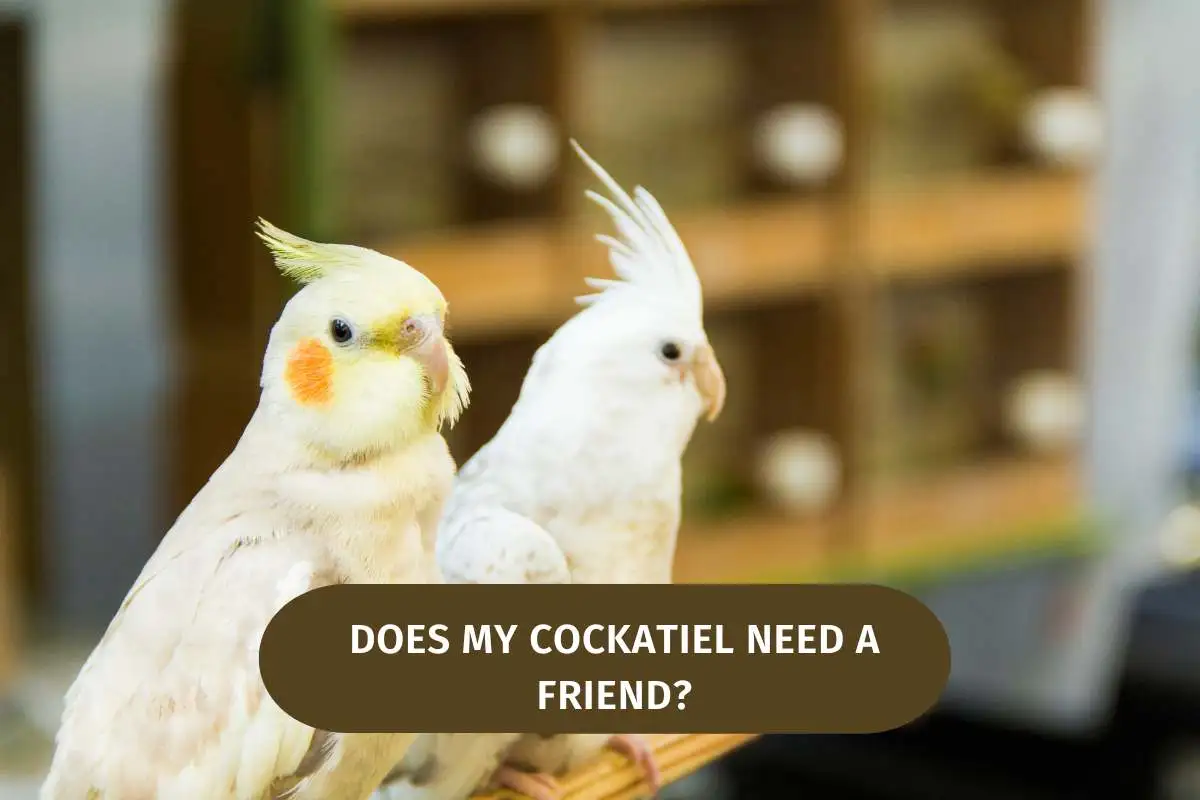Cockatiels are social animals and can benefit from having a friend or companion. There are many reasons, your cockatiel may need a friend-
One of the primary reasons people choose to get a friend for their cockatiel is to provide them with socialization and mental stimulation. Cockatiels are flock animals; in the wild, they live in large groups.
They can sometimes become lonely or bored in captivity if they don’t interact enough with other birds or their human caregivers. A companion can help alleviate this by providing your cockatiel with a friend to play and socialize with.
Is it better to have 2 cockatiels?
A companion can help alleviate loneliness and boredom and provide your cockatiel with a friend to play and socialize with.
However, it’s important to remember that not all cockatiels will get along with new cockatiels. Introducing a new companion can sometimes be stressful for both birds, and it’s essential to introduce them slowly and carefully to avoid any fights or aggression.
It’s also essential to provide plenty of space for both birds to have their areas to retreat to if they need some time alone.
The decision to get two cockatiels will depend on your situation. If you have the time, space, and resources to provide for two birds, and you’re confident that your cockatiel will get along with a new companion, it can be a great way to enrich your bird’s life.
Two cockatiels in one cage, is it safe?
Keeping two cockatiels in one cage is generally safe as long as the cage is large enough to provide enough space for both birds. But it’s essential to introduce them slowly and carefully to avoid any fights or aggression.
When keeping two cockatiels together, the cage should be at least 18 inches wide, 18 inches deep, and 24 inches tall. It’s also important to provide plenty of perches, toys, and other forms of enrichment to keep your birds mentally and physically stimulated.
It’s also important to monitor your birds closely when they are first introduced to each other, to ensure that they are getting along and are not displaying any aggressive behavior.
If you notice any signs of fighting or aggression, it’s important to separate the birds and try again later.
Can you keep a male and female cockatiel together?
Keeping a male and female cockatiel together is generally safe, but it’s important to monitor their behavior and be prepared to separate them if necessary.
One potential issue with keeping a male and female cockatiel together is the risk of breeding. Cockatiels are known to be prolific breeders, and if a male and female are housed together, they may mate and produce offspring.
This can be a significant time and financial commitment, and it’s important to be prepared for the possibility of raising baby cockatiels if you finally decided to keep a male and female together.
Another potential issue is the risk of aggression or fighting between the male and female. While most cockatiels will get along with a new companion, there is always the possibility that they may not get along and may display aggressive behavior toward each other. It’s essential to introduce them slowly and carefully and to be prepared to separate them if necessary.
Can a male cockatiel live alone?
A male cockatiel can live alone, but it’s crucial to provide them with plenty of love, attention, and mental stimulation to keep them happy and healthy. However, a single male cockatiel can be a loving and enjoyable pet with the proper care and attention.
It’s also important to spend regular time interacting with your cockatiel and providing them with socialization. This can include talking to them, singing to them, and offering them toys and treats to play with.
Providing your cockatiel with regular interaction and stimulation can help alleviate any loneliness or boredom they may experience as a single bird.
How do I know if my cockatiel is lonely?
A few signs can indicate that your cockatiel is feeling lonely or bored. Some common symptoms of loneliness in cockatiels include:
- Excessive vocalization: Cockatiels are naturally vocal animals, but excessive vocalization can sometimes signify loneliness. If your cockatiel is making a lot of noise, particularly when you are not interacting with them, it could be a sign that they are feeling lonely.
- Loss of appetite: When birds feel stressed or lonely, they may lose interest in food and stop eating. If you notice that your cockatiel is not eating as much as usual, it could signify that they feel lonely.
- Plucking or feather-damaging behavior: Cockatiels may engage in plucking or feather-damaging behavior when feeling stressed or lonely.
- Lack of activity: Cockatiels are naturally active and curious animals, and a lack of activity can signify they are bored or lonely. If you notice that your cockatiel is not moving around as much as usual, or if they seem less interested in toys and activities, it could signify feeling lonely.
How do you introduce a second cockatiel?
Introducing a second cockatiel to your existing cockatiel can be challenging, and it’s important to do it slowly and carefully to avoid any fights or aggression. You can follow the steps below to introduce a second cockatiel to your existing bird:
- Set up a separate cage for the new bird: Before introducing the new bird to your existing cockatiel, it’s important to set up a separate cage for them to live in. This will give them a safe and comfortable place to live while they are getting used to their new surroundings.
- Place the cages next to each other: Once the new bird is settled in their cage, place the cages next to each other so both bird can see & hear each other. This will allow them to get used to each other’s presence without being able to interact physically.
- Allow the birds to see and hear each other for several days: Leave them in their separate cages for several days, allowing them to see and hear each other but not physically interact. It will help them get used to each other’s presence and can help prevent any fights or aggression when they are finally introduced.
- Gradually introduce the birds: Once the birds seem comfortable with each other’s presence, you can gradually introduce them to each other. Start by placing the birds in separate carriers or small cages and allowing them to see and smell each other. Then, gradually increase the time they spend together, always supervising them carefully and separating them if necessary.
- Provide plenty of space and enrichment: Once the birds are introduced, it’s essential to provide them with plenty of space and enrichment to keep them happy and healthy, which can include providing a large cage, as well as regular socialization and interaction with their human caregivers.
Introducing a second cockatiel to your existing cockatiel can be challenging, but with patience and careful planning, you can help your birds get along and live happily together.
Do cockatiels get jealous of other cockatiels?
Cockatiels are social animals and can benefit from having a companion, but like any pet, they can sometimes become jealous or possessive of their human caregivers or other birds. This can happen if they feel like they are being replaced or not getting enough attention, leading to aggression or other behavior problems.
Cockatiels can sometimes become jealous or possessive of other birds or their human caregivers. Still, with careful management and attention, you can help prevent these behavior problems and keep your birds happy and healthy.
Did I answer everything you need to know about- Does My Cockatiel Need A Friend?
In this article I have explained why it is necessary for your cockatiel to have friends. Having a companion, cockatiel will have mental stimulation, which is good for their heath. Some cockatiel may also live alone, but need contact attention from their owner.

